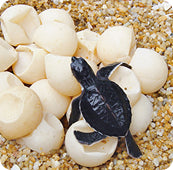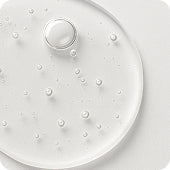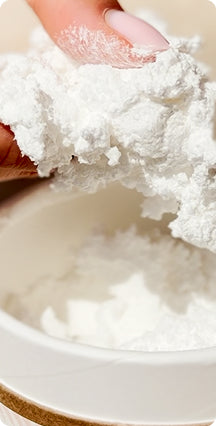You probably didn't know that about deodorants
You probably didn't know that about deodorants

sweat. Some sweat quickly and profusely, others hardly ever. In society, sweat and especially sweat stains are still a kind of taboo subject or something that most people find very uncomfortable.
what is sweat
Sweat is a watery secretion secreted by the sweat glands. This process is also called transpiration or diaphoresis. Perspiration is the body's natural response to regulate body heat. If the sweat evaporates from the skin, a cooling effect is created. Sweat also increases skin moisture and helps keep the skin supple. Without these secretions, our skin would dry out and bacteria and germs would have an easier time entering the body. Sweating facilitates the body's natural detoxification. For example, toxins such as alcohol are partially drained from the body.
Why you sometimes sweat more and sometimes less
Sweat is a natural function of the body. However, certain factors promote sweat production:
- Physical exertion
- emotional tension
- Fear
- stressful situations
- hormonal changes
The inability to produce sweat is called anhidrosis.
Why does sweat smell?
Sweat consists of 99% water. Fresh sweat is usually odorless. The smell is caused by bacteria that live in our armpits. These feed on the proteins in sweat and produce metabolic products that create the unpleasant odor.
What you can do about it
There are usually two approaches. Either you use an antiperspirant or a deodorant. Antiperspirants prevent or reduce perspiration by clogging the sweat glands with aluminum salts, for example.
If you don't want to prevent the body's natural function and thus efficient cooling, you can use deodorants . Deodorants do not prevent perspiration, but can help mask the odor with the help of perfume and antibacterial ingredients.
Are aluminum salts in deodorants carcinogenic?
Aluminum salts were on everyone's lips for a long time. Consumers were warned about them because of the suspicion that aluminum salts could be carcinogenic. The data situation was rather uncertain and therefore caution was called for, according to the motto: "It's better to be safe than sorry".
However, new study results were published in March 2020. It turned out that the amounts absorbed by deodorants or cosmetics are negligible . In this video by the scientist Mai Thi Nguyen-Kim, she goes into the situation in more detail.
Do you use deodorant every day ? If so, then you are one of the almost 38% of Germans who do the same. The market for deodorants is huge:
- In 2019 , 255 million deodorant spray cans were sold in Germany alone.
Light metal but heavy impact
Did you know that the rainforest is being cleared for deodorant aerosol cans?
Deodorant aerosol cans are made from tinplate and aluminum . While the cans are easy to recycle, extracting the metal is very resource- and energy-intensive and has a major impact on the rainforest. Aluminum is a very common metal in the earth's crust. However, it only occurs in compounds with, for example, bauxite. This aluminum ore is obtained by laboriously removing the upper layers of the earth.
It takes as much electricity to produce one ton of aluminum as a two-person household uses in five years.
Large areas of the rainforest are cut down for bauxite mining. In Porto Trombetas, Brazil, an area the size of 250 soccer fields is cleared every year.
Toxic waste
- Up to four tons of toxic red-colored sludge are produced per ton of aluminum.
The red mud is stored in huge holding tanks, but there are regular leaks or dam failures in the tanks. The mud is ferrous and also contains toxic heavy metals such as lead, cadmium and mercury. Leaks flood entire villages and the caustic mud turns living rivers into dead zones . People who live near the mines or factories often report skin diseases, contaminated drinking water and fish kills.
Switch to deodorant sticks


We rely on environmentally friendly and 100% plastic-free packaging . Our deodorant sticks are also 100% plastic-free and are offered in a cardboard sleeve. With our deodorant sticks in the flavors ' lemon ' and ' coconut cream ' you always give your armpits the freshness they need. No greenhouse gases are required for our deodorant sticks, nor are parts of the rainforest cut down for aluminium.
Arrested for deodorant
If you now banish your deodorant spray cans from your routine and switch to more sustainable deodorants, then the correct disposal of the cans is important. CFC greenhouse gases (compounds of chlorine, fluorine, carbon and hydrogen) are no longer used in deodorant sprays, but other propellants are used to transport the gases out of the spray cans. Usually a mixture of isobutane and butane, the effect of which on our climate is smaller but still there. These propellants are extremely flammable. If you have used up all of your deodorant spray and there is a green dot on the can, you can throw it in the yellow bin. Cans without a green dot or with residual contents should be disposed of at pollutant collection points , as there is a risk of deflagration or even explosions. These can lead to fires in landfills, rubbish bins and vehicles and put people's lives at risk. Anyone who still disposes of the bottles in the yellow bag or with the residual waste can collect a report.
Switch now to our 100% natural deodorants. As part of the 'Starter Set' essential deal, you can try our 'Cocos Cream' deodorant stick and other essentials for a plastic-free bathroom , save 20 percent compared to buying them individually and do something good for the environment.
If you would like to be informed directly about the latest blog posts, please follow us Instagram ! :-)











